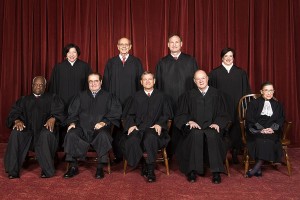Upcoming Supreme Court Cases to Watch

This past U.S. Supreme Court term was not encouraging for humanists. In the ruling on Town of Greece v. Galloway, we saw religion privileged when the Court declared sectarian legislative prayer to be constitutional. In the Burwell v. Hobby Lobby decision last week, the Court maintained that the religious beliefs of employers trump the rights of their female employees to contraceptive healthcare. But the rights of the religious and non-religious will again be an issue that goes before the Court in October cases concerning the First Amendment that humanists will want to watch.
One notable case is Reed v. Town of Gilbert. Clyde Reed, pastor of Good News Community Church, claims that the Town of Gilbert’s sign ordinance violates his right to free speech and discriminates against religious messaging. The Town of Gilbert, a suburb outside of Phoenix, Arizona, has rules in place that limit the size of signs put up for non-commercial groups advertising events, as well as the amount of time that they can be displayed. Even though the ordinance is applied to all non-commercial groups, which happens to include churches, Reed claims that the town’s policy is discriminatory because political signs can be larger and may be posted for a longer duration of time. He requests that the Supreme Court decide if the town is discriminating against his church based on the content of the signs it posted, which advertised worship services. Humanists should pay particular attention because the ruling could ultimately affect not only town ordinances on posting signs with religious messages but also policies regarding public events such as political rallies.
Another case involving religion that could have far-reaching consequences is Holt v. Hobbs, in which an Arkansas prison inmate has been denied a religious exemption to grow a beard. Gregory Holt, also known as Abdul Malik Muhammed, is a devout Salafi Muslim, whose religious beliefs require that allow his facial hair to grow at least a half inch long. In over forty other prison systems, Muhammed’s exemption would be granted, and in previous cases, the courts have upheld prisoners’ rights to exercise their religious freedoms while in prison. Holt v. Hobbs is particularly noteworthy because it stands in contrast to cases that the Supreme Court has heard this term, such as Burwell v. Hobby Lobby, which mask religious imposition as religious liberty. Unlike the Hobby Lobby case, in which employer’s religious beliefs place a substantial burden on employees seeking certain forms of birth control, the exemption granted here would not impact anyone except the inmate. How the Court rules could influence future religious liberty cases, especially those that concern the rights of individuals.
As well as considering the religious rights of individuals, the Supreme Court will likely be deciding the religious rights of nonprofit organizations. In response to the Hobby Lobby ruling, many religious nonprofits are claiming that even providing insurance plans that cover certain types of contraception is in violation of their beliefs. Under the exemption granted by the Obama administration, these groups can already decline to cover contraceptives and the insurance companies would take care of the cost. However, some religious nonprofits object to this modification because it makes them complicit in the provision of birth control. Similar to the Hobby Lobby case, these organizations want the government to privilege their beliefs, at the expense of their employees’ access to reproductive healthcare.
In October, keep an eye on these high-profile cases and the effect they may have on First Amendment rights in this country. While it’s impossible to know how the Supreme Court will rule on these cases, humanists can be sure that the fight for freedom of religion—and freedom from religion—is far from over.
